|
|
|
Sort Order |
|
|
|
Items / Page
|
|
|
|
|
|
|
| Srl | Item |
| 1 |
ID:
128775
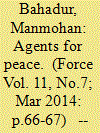

|
|
|
| 2 |
ID:
192067
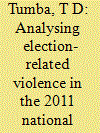

|
|
|
|
|
| Summary/Abstract |
This study seeks to explore the triggers, perpetrators and consequences of electoral violence in the 2011 national elections in the Democratic Republic of Congo (DRC). From the perspective of different domestic and international electoral observers, the 2011 elections in the DRC were marred by violence. A qualitative approach based on secondary resources was employed to achieve the purpose of the study. Following the content analysis of various documents related to electoral violence during the 2011 elections in the DRC, the findings of the study indicated that members of law enforcement and state agencies (police, the national intelligence agency, the Republican Guard and administrative authorities) including supporters of political parties were identified as the main perpetrators of election-related violence in the DRC. In addition, the paper showed that structural causes such as weak institutionalisation of democracy together with lack of national sense of cohesion were the potential triggers of the 2011 election-related violence in the DRC.
|
|
|
|
|
|
|
|
|
|
|
|
|
|
|
|
| 3 |
ID:
072219
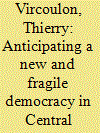

|
|
|
| 4 |
ID:
113212
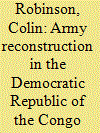

|
|
|
|
|
| Publication |
2012.
|
| Summary/Abstract |
Since the peace agreements of 2002-2003 which ended the second war in the Democratic Republic of Congo, reconstruction of the army has been an inherently political process, in common with other attempts to carry out security sector reform (SSR). This article briefly sketches out the Congolese army's history, then attempts to fill a gap in the literature on Congolese SSR by detailing what can be found of the actual structure and shape of the present army. The efforts that have been made to reform the army are then examined, followed by a conclusion which examines the major issues and possible ways forward.
|
|
|
|
|
|
|
|
|
|
|
|
|
|
|
|
| 5 |
ID:
145178
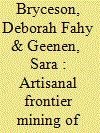

|
|
|
|
|
| Summary/Abstract |
This article studies the transformative nature of ‘artisanal frontier mining’ in view of sub-Saharan Africa's mining history. Artisanal gold production has generated livelihood earnings for millions of people in sub-Saharan Africa. Yet we must go beyond a study of artisanal mining as an individual livelihood choice and consider the sector's internal dynamics. In this sense, the concept of ‘labour transformation’ is helpful. It refers to a process in which individuals' skill acquisition, economic exchange, psychological reorientation, and social positioning evolve towards a shared occupational identity and collective professional norms, leaving considerable scope for self-governance amongst artisanal miners. This process is captured in the notion of the ‘frontier’, which in our case refers to occupational rather than geographic locational change. However, the frontier is necessarily of limited temporal duration given the existence of gold as a non-renewable resource, the depth of the gold supply sinking beyond the exploratory and extractive reach of artisanal miners, and the expanding interests of foreign mining corporations and the state. Our argument is illustrated through a comparison of the artisanal mining experiences of two neighbouring countries, Tanzania and the Democratic Republic of Congo (DRC), whose artisanal labour patterns are remarkably similar to each other despite their very different national political contexts and the DRC's recent experience of conflict mineral production.
|
|
|
|
|
|
|
|
|
|
|
|
|
|
|
|
| 6 |
ID:
115434
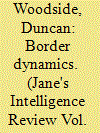

|
|
|
| 7 |
ID:
108607
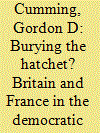

|
|
|
|
|
| Publication |
2011.
|
| Summary/Abstract |
Against the background of conflict in the Great Lakes Region, the UK and France promised, at their 1998 Saint-Malo summit, to set aside rivalries and cooperate on Africa. In subsequent Anglo-French gatherings, they singled out the DRC and pledged to work together there to promote peace and tackle poverty. This article asks whether this coordination took place and whether it involved a 'deconflictualisation' of approaches, 'coincidental' cooperation, or 'sustained and reciprocal' collaboration. It looks for evidence of institutionalisation of UK-French ties and policy cooperation in the fields of peacebuilding and poverty reduction. It then identifies the pressures for, and barriers to, collaboration, focusing particularly on the role of interests, foreign policy norms, institutional factors and resource constraints. It concludes by setting out the wider implications of UK-French cooperation and the limited prospects of closer future collaboration.
|
|
|
|
|
|
|
|
|
|
|
|
|
|
|
|
| 8 |
ID:
127041
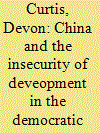

|
|
|
|
|
| Publication |
2013.
|
| Summary/Abstract |
This article analyses China's contemporary engagement in the Democratic Republic of the Congo (DRC) as an example of Chinese involvement in a resource-rich, conflict-affected country. Following a large 'minerals for infrastructure' agreement signed in 2008, China's activities in the DRC are often presented as an example of a departure from Western-led liberal peacebuilding and development, by providing 'corrupt' Congolese national elites with new sources of unchecked rents; or it is viewed as a positive alternative to Western approaches, by focusing on win-win development and reconstruction. Both these views are flawed. Rather than offering a marked alternative to a Western 'liberal' peacebuilding project, this article argues that Chinese interests have increasingly coincided with evolving Western interests in support of stabilization and market-driven economic activities. This, however, does not offer a clear pathway to security and development in the DRC. On the contrary, both Chinese and Western involvement in the DRC provide possibilities for continued insecurity, rather than any fundamental break from previous patterns and structures of politics.
|
|
|
|
|
|
|
|
|
|
|
|
|
|
|
|
| 9 |
ID:
109926
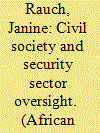

|
|
|
|
|
| Publication |
2011.
|
| Summary/Abstract |
Much is made in the security sector reform literature of the role of civil society as an overseer and monitor of the security sector, contributing to improved accountability and governance. This paper looks at how the notion of 'civil society capacity' needs to be disaggregated in order to develop meaningful strategies to assist civil society organisations to impact security sector reforms in complex, post-conflict contexts like the Democratic Republic of Congo. It draws on fieldwork conducted with 200 Congolese civil society groups that are attempting to engage in current security sector reform processes, and looks at which capacities are required to improve oversight by civil society groups.
|
|
|
|
|
|
|
|
|
|
|
|
|
|
|
|
| 10 |
ID:
104599
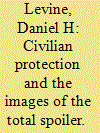

|
|
|
| 11 |
ID:
119718
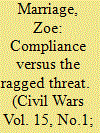

|
|
|
|
|
| Publication |
2013.
|
| Summary/Abstract |
Northern development policies in African countries affected by war are shaped by security concerns and have neoliberal and realist elements. The neoliberal economic policy purports to be inclusive, but when it meets non-compliance, realist ambitions are pursued through the use or strategic oversight of force. The liberalisation of mining in Katanga, Democratic Republic of Congo, was promoted through northern policy and was exclusive in strengthening unaccountable domestic governance. This marginalised the majority of the population politically and economically and reinforced the international political economy. Consequently, northern intervention has increased insecurity in Congo, and is potentially destabilising in contravening reciprocity in international relations.
|
|
|
|
|
|
|
|
|
|
|
|
|
|
|
|
| 12 |
ID:
119730
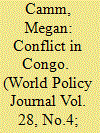

|
|
|
|
|
| Publication |
2011.
|
| Summary/Abstract |
Ituri, Democratic Republic of the Congo-It is July 20, 2010, and Djupanyahonoré is a ghost town populated by 644 ghosts. The heaped skeletons of its dwellings lie cold, but the acrid tang of burned houses pollutes the mountain air. Bending at their hips, the women of this northeastern hamlet scoop charred beans into the folds of their colorful pagnes, multi-purpose swaths of waxed cotton that serve at once as clothing, baby slings, and blankets. With laden skirts, they walk barefoot over blackened thatch to add their beans to a growing heap, where grandmothers with arthritic fingers pick out the edible ones. Old men sit silently in the shade while the young men rummage through rubble, excavating the remains of their huts' wooden supports. These will fuel the evening cooking fire and protect the oldest, youngest, and weakest members of the community from plummeting night temperatures. It's the rainy season, and at an altitude of over 5,500 feet, passing the night without shelter is hazardous.
|
|
|
|
|
|
|
|
|
|
|
|
|
|
|
|
| 13 |
ID:
145365
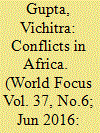

|
|
|
|
|
| Summary/Abstract |
In Africa, there is a dire need of cultural plurality sensitization so as to integrate all the ethnic groups and accommodate them giving a proper share in power structure. Modern and technological education is urgently required so that Africa is not dependent on foreign nations to explore their resources. They should be able to be their equal partners and shun their dominance. The resources, instead of being wasted on conflicts, may be utilized for development of Africa and the Africans could become the wealthiest persons.
|
|
|
|
|
|
|
|
|
|
|
|
|
|
|
|
| 14 |
ID:
145616
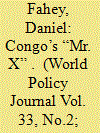

|
|
|
|
|
| Summary/Abstract |
When Daniel Fahey visited eastern Democratic Republic of Congo as coordinator of the U.N.’s Group of Experts, he found a charismatic charlatan known as “Mr. X” under the protection of the U.N. A star witness in a murder trial, Mr. X had convinced the U.N. of his tall tales. Fahey shows how Mr. X’s story sheds light on the emerging role of intelligence in peacekeeping operations and the unpredictable effects of its failures.
|
|
|
|
|
|
|
|
|
|
|
|
|
|
|
|
| 15 |
ID:
112124
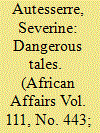

|
|
|
|
|
| Publication |
2012.
|
| Summary/Abstract |
Explanations for the persistence of violence in the eastern part of the Democratic Republic of Congo blame the incendiary actions of domestic and regional leaders, as well as the inefficacy of international peace-building efforts. Based on several years of ethnographic research, this article adds another piece to the puzzle, emphasizing the perverse consequences of well-meaning international efforts. I argue that three narratives dominate the public discourse on Congo and eclipse the numerous alternative framings of the situation. These narratives focus on a primary cause of violence, illegal exploitation of mineral resources; a main consequence, sexual abuse of women and girls; and a central solution, extending state authority. I elucidate why simple narratives are necessary for policy makers, journalists, advocacy groups, and practitioners on the ground, especially those involved in the Congo. I then consider each narrative in turn and explain how they achieved prominence: they provided straightforward explanations for the violence, suggested feasible solutions to it, and resonated with foreign audiences. I demonstrate that the focus on these narratives and on the solutions they recommended has led to results that clash with their intended purposes, notably an increase in human rights violations.
|
|
|
|
|
|
|
|
|
|
|
|
|
|
|
|
| 16 |
ID:
097656
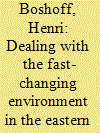

|
|
|
|
|
| Publication |
2009.
|
| Summary/Abstract |
This article discusses conflict dynamics in eastern Democratic Republic of Congo (DRC) over the period 2007-2009.
|
|
|
|
|
|
|
|
|
|
|
|
|
|
|
|
| 17 |
ID:
097658
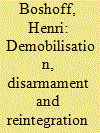

|
|
|
|
|
| Publication |
2009.
|
| Summary/Abstract |
This article surveys disarmament, demobilization and reintegration (DDR) efforts in the Democratic Republic of Congo (DRC), focusing on initiatives by the Forces Démocratiques pour la Libération du Rwanda (FDLR) and the Congrès National pour la Défense du Peuple (CNDP).
|
|
|
|
|
|
|
|
|
|
|
|
|
|
|
|
| 18 |
ID:
080702
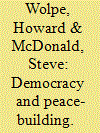

|
|
|
|
|
| Publication |
2008.
|
| Summary/Abstract |
This article, which is a systematic analysis of the practical experiences of the authors in facilitating workshops to help resolve African conflicts, argues that we need to think again about how we both conceptualize and operationalize peace-building techniques. As the Iraq debacle may be said to show, to impose a peace settlement and democratic government institutions on a state and people after a war does not, by itself, work. What is needed is a much deeper understanding by the parties to the conflict that they have shared interests, a common vision and must learn to work in collaboration with one another. In their work in Burundi, the Democratic Republic of Congo and Liberia, the authors and their team have developed new training techniques that are based on experiential learning. They organize workshops that bring key leaders together in a long-term process designed to resolve the tensions and mistrust that are the inevitable by-product of conflict and war, and to build (or rebuild) their capacity to work effectively together across all of the country's lines of ethnic and political division. Through the teaching of concepts such as 'interest-based negotiation' they aim to develop better real communication between the parties and to enhance collaborative capacity that will help build really solid personal and institutional relationships and lasting peace.
|
|
|
|
|
|
|
|
|
|
|
|
|
|
|
|
| 19 |
ID:
108120
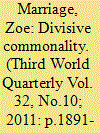

|
|
|
|
|
| Publication |
2011.
|
| Summary/Abstract |
Northern donor policies relating to building a common future and building peaceful states and societies go to the heart of national and international security agendas. This article critiques the concept of commonality between donors and recipients and within recipient countries. It argues that the policies are problematic from the perspective of security theorising, both in their mooted 'commonality' and in terms of the political intervention that they imply. Historically security has been competitive and founded on compromise rather than commonality, and the internal legitimacy of states has been contested domestically, rather than 'built' from outside. Using the example of the Democratic Republic of Congo, the article argues that the ahistorical assumptions of these policies and the activities they license have entrenched specific forms of insecurity. There have been some returns to the donors and implementing partners but also some costs, which had not been calculated, as lessons have not been drawn from past experiences.
|
|
|
|
|
|
|
|
|
|
|
|
|
|
|
|
| 20 |
ID:
145962
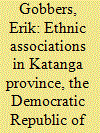

|
|
|
|
|
| Summary/Abstract |
This article unravels the world of ethnic associations in Katanga that emerged as a result of rural–urban migration. These associations constitute a multi-tier system reflecting ethnic, provincial and national identity levels. Primarily meant to organise mutual aid and foster cultural values, they have behaved as interest groups since democracy was re-established in the 1990s. Representing ethnic communities, they try to influence the distribution of spoils through lobbying activities, emphasising the right of ‘autochthons’ to be prioritised regarding employment and development. Political and socio-economic changes trigger identity shifts and ethnic associations adapt by inventing alternative ‘autochthony’/‘allochthony’ dichotomies, causing friction between communities. The multi-tier system provides forums where ethnic differences can be negotiated and ethnic communities can integrate. In its current manner of functioning it is only effective at mitigating acute crises. In order to resolve more complex political issues, it would benefit from a preventive approach within a permanent framework of consultation between associations and authorities.
|
|
|
|
|
|
|
|
|
|
|
|
|
|
|
|
|
|
|
|
|